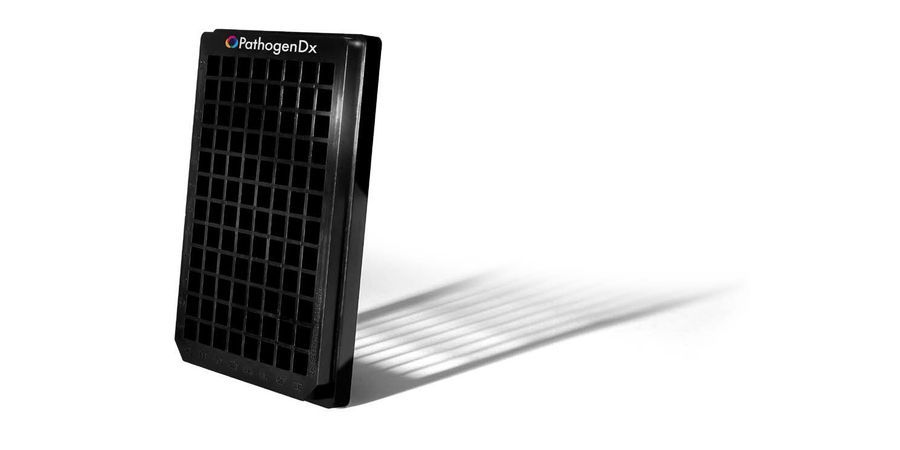As the SARS-CoV-2 virus evolves, mutations in the CoV-2 genome can increase the risk of false negative results in any of the existing molecular tests. With several variant strains circulating in the population— including some with increased transmissibility—and the potential for more to emerge, there is an urgent need for diagnostic tools which can accurately detect any clade variant (i.e., show 100 percent inclusivity), and distinguish clade variants from each other. Currently, next-generation sequencing (NGS) technology is the primary tool available to distinguish CoV-2 clade variants, but has several major limitations: high cost, low speed, and analysis of a limited number of samples per run. The PathogenDx DetectX-Cv clade variant adaptive surveillance test is a cost-effective, rapid, and very high throughput alternative to NGS that enables clade variant testing at population scale. It can be implemented in any CLIA-certified laboratory performing real-time quantitative reverse transcription PCR (qRT-PCR) to deliver follow-on clade identification on any sample previously determined to be COVID positive, more or less in real time.

Comparing PathogenDx DetectX-Cv Technology and NGS
NGS platforms sequence millions of DNA fragments in parallel and the resulting sequence data is aligned against the SARS-CoV-2 reference genome to detect mutations. Identifying viral variants with NGS involves qPCR analysis to identify SARS-CoV-2-positive samples, followed by RT-PCR, amplification, library preparation, NGS sequencing, analysis, and reporting. While accurate, this approach is complex and inefficient, as it requires up to two weeks to obtain results at full population scale and can detect only a limited number of samples per run. In addition, NGS becomes very expensive when it comes to having to process hundreds if not thousands of samples.
DetectX-Cv clade-array technology reduces time-to-result from weeks to less than four hours. The current microarray clade architecture can discriminate among seven prevalent CoV-2 clade variants in parallel (including UK, South Africa, L452R, Brazil P1, Brazil P2, India, and Wuhan) with the capacity to add additional clade variants of concern in less than four weeks. The process combines viral RNA extraction, which may be performed on any PCR platform, with one-step asymmetric RT-PCR on a 96-well microarray followed by DNA hybridization and washing, then autonomous imaging of the resulting data and hands-free analysis of those data to generate a clade variant report. The entire process, including imaging, analysis, and reporting, can be completed in just four hours, for multiples of 96 samples in parallel. From an economics standpoint, this solution is 10-20 times less costly than NGS, per sample.

In addition to rapidly discriminating among multiple prevalent clade variants in parallel, DetectX-Cv enables identification clade variant samples “of interest,” which can be sent for full sequencing. This eliminates repetitive sequencing of known variants and maximizes limited sequencing resources to reduce the time required to post variant ID to the Centers for Disease Control and Prevention and deposit the sequence data into electronic databases.
There are many benefits to be gained with more rapid molecular diagnostics, but they should not come at the cost of performance. DetectX-Cv technology incorporates redundant single nucleotide polymorphism (SNP) analysis at each target region (including universal mutant and wild-type). The result is specificity comparable to and potentially greater than sequencing methods.
Clear advantages for clade-array technology
Controlling the spread of SARS-CoV-2 and its variants requires rapid, accurate molecular diagnostics. Current molecular tests are insufficient to detect clade variants (potentially resulting in false negatives), and sequencing technologies are costly, labor-intensive, and inefficient. DetectX-Cv technology overcomes these limitations and can significantly enhance variant testing capacity.
The multiplex array can fit approximately 150 unique probes for multiple CoV-2 mutations to reduce the risk of false negatives and provides final results in just hours. Using a small sample volume (obtained from standard nasopharyngeal swabs), the array achieves the equivalent of over 60 multiplex PCR reactions in parallel. The assay is also amenable to automation to facilitate high-throughput testing.
DetectX-Cv technology also offers superior ease of use. Sequencing techniques require highly skilled technicians to perform the assay, and informatics tools for sequence alignment, variant calling, and data visualization. As such, a major advantage of DetectX-Cv technology is simplicity. The assay can be performed with minimal operator training, by any technician already trained to perform other nucleic acid tests (such as qRT-PCR) in any CLIA laboratory performing SARS-CoV-2 screening.
Cost is also an important determinant of variant screening capacity. The complexity and high cost of sequencing platforms and their associated informatics tools are prohibitive and sequencing bandwidth is limited as a result. DetectX-Cv technology is much simpler, and more affordable. At approximately one-tenth to one-twentieth the cost of a sequencing platform, it significantly enhances testing capacity.
Finally, DetectX-Cv technology is highly flexible. Its content can be upgraded in as little as 4 weeks to include newly discovered clade variants or other common viruses, including influenza A and B.
The COVID-19 pandemic has presented numerous challenges for scientists, clinicians, and public health officials around the world. As the SARS-CoV- 2 virus mutates and novel CoV-2 clade variants emerge over time, it presents yet another challenge: deploying a real-time increase in variant testing capacity. PathogenDx’s rapid, accurate, and affordable DetectX-Cv clade-array technology overcomes the limitations of existing test methods, and can support a safe return to work, school, and activities within our communities.

